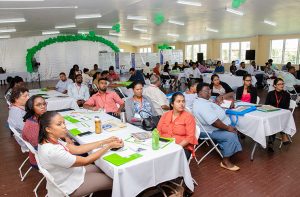– says NAREI Director
By Navendra Seoraj
TECHNOLOGY has been dubbed as the key to innovation and modernisation in every sector, and Director of the National Agricultural Research and Extension institute (NAREI) Dr. Odhu Homenauth believes that this could nurture the next generation of farmers.
“We need to make agriculture more tech-savvy… Robotics, sensors and the Internet can make the agriculture sector more interesting and exciting for young people,” said Dr. Homenauth during his remarks at the launch of NAREI’s two-day research conference at the Guyana School of Agriculture on Tuesday.

Conventional thinkers have often associated agriculture with old and uneducated people, but over the years agriculture has proven to be a sustainable and fruitful sector, which is the breadbasket of an economy. Agriculture is a sector which young people should consider getting into, and Dr. Homenauth believes the advent of technology in the sector would encourage more young people to get involved. He said the new generation can help to transform farming into a high-tech profession that requires skill sets like engineering, computing and data analytics.
“The current generation as well as future generations have different needs and interests, and it is imperative that we continue to excite and enthuse them so that more young people can get into the sector,” said Dr. Homenauth.
Over the years, the practices in one of the world’s oldest professions, agriculture, have been evidently sustainable and modern. The adoption of sustainable and modern practices is owed to agricultural research which has been at the forefront of agricultural development.
“When agriculture and research work together, we have the potential to shift up a gear. In other words, research provides the impact for agricultural development,” Dr. Homenauth said, adding that agricultural scientists need to actively seek to devise procedures and practices that will increase overall food quality.
Currently in the sector, work is ongoing in artificial insemination, embryo transfer, and biological control of pests, hydroponics and tissue culture, among other things. From the implementation of these types of research activities, the ultimate goal is to increase farmers’ profits, thereby increasing livelihoods. The activities are also aimed at ensuring that the environment is protected.
Agricultural research, both innovative and adaptive, is crucial to ensuring sustainable agricultural development. And according to Dr. Homenauth, agriculture often places significant pressure on natural resources and the environment.
Sustainable agricultural practices are intended to protect the environment, expand the earth’s natural base, and maintain and improve soil fertility. Agricultural research is one of the main factors contributing to shifts in agricultural production systems and changes in the rural world.
IMPROVE PRODUCTIVITY
In particular, research is helping to improve productivity to increase agricultural incomes and to change agricultural practices. Dr. Homenauth said various assessments have shown that research is one of the most effective investments for both the rural and urban populace, because it contributes to protecting the environment, preserving landscapes and creating rural jobs.
“Our current and future research agenda must continue to give priority to strategies for sustainable and economic development,” said the NAREI director.

Permanent Secretary in the Ministry of Agriculture Delma Nedd, who spoke along the same lines, said that as the sector continues to expand the research agenda, the authorities need to focus more on mechanisation, crop modelling, precision agriculture, biotechnology, conservation of biodiversity, germplasm maintenance and more.
Such research must be based on the needs of farming communities, as they are the ultimate beneficiaries of the work done by researchers.
Also, given the impact of climate change in Guyana, there is an urgent need to identify which crop varieties and technological options would be better suited for futuristic climatic conditions in the country. Such research, Nedd believes, would inform decision-making on investments towards reducing disaster risk and boosting the resilience of the sector.
She believes that changes in agricultural methodologies and practices must be driven by research and data collection. “In keeping with the Green State Development Strategy, identifying new technologies through innovative and adaptive research will contribute significantly to agricultural productivity, and this, in turn, will benefit farmers both economically and environmentally,” said Nedd.
In that regard, this year’s research conference aims to identify new opportunities and possibilities in improving and sustaining productive and diverse agriculture. The conference was held under the theme, “Paving the way for sustainable development through innovative and adaptive research”.
This theme is in consonance with the theme for agriculture month 2019, which is “Sustainable agriculture for ensuring good safety and a green economy”.
Minister within the Ministry of Agriculture with responsibility for Rural Affairs Valerie Adams-Yearwood said the theme is significant because it shows that NAREI has created a clear pathway in the area of research for others to follow. She said the theme also shows that there is a transfer of opportunities of new solutions and strategies to deliver quality products and services to farmers. The minister believes that a good plan is necessary in order achieve the goals of the sector, and also improve what already exists.



.jpg)








